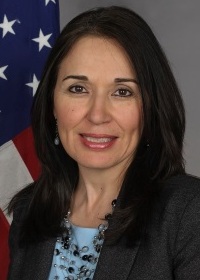
The latest address in the Edward J. Perkins Distinguished Speaker Series at Lewis & Clark hosted Ambassador Carmen Cantor, the Assistant Secretary of the Interior for Insular and International Affairs. While in Portland, she spoke at both the undergraduate and law campuses on topics related to career development and her work in the Department of the Interior.
Ambassador Cantor had much to say in her addresses, recounting her career path from her education in her native Puerto Rico to her time working in the United States federal government.
She began working out of college as a night shift clerk for the United States Postal Service, and from there decided to enter the civil service working for the State Department under Former Secretary of State Colin Powell.
Taking every opportunity she could to grow her skills, Cantor worked through a litany of additional federal jobs, gradually rising through the ranks of management. Some of these included a director position at the Foreign Agricultural Service and Executive Director of the Bureau of Counterterrorism before she returned to the State Department as Deputy Director.
From there, it was not an easy path to her ambassadorship. Cantor was and still is a member of the Civil Service, whereas most of the State Department is made up of Foreign Service personnel. These are two career tracks within the federal government, with the foreign service usually assigned overseas and the civil service working domestically. The number of Civil Service members appointed to ambassador positions is vanishingly small, about one or two a year by most estimates.
Despite these odds, Cantor was selected for the position and became the U.S. Ambassador to Micronesia, where she arrived exactly one day before the nation closed its borders due to COVID in 2020. During her time in Micronesia, Cantor’s work centered on womens’ rights.
“I also focused on empowering women and young girls,” said Cantor. “At the time I went to Micronesia in early 2020, the country was one of the two countries in the world with no women in the legislature at all.”
Being a woman in a position of leadership herself, she fought to help young women see their potential for making great contributions to society.
“We did a couple of things, for example, we helped reestablish Girl Scouts in Micronesia,” Cantor said. “We held workshops and panels that talked about economic empowerment of women. We helped raise awareness about gender based violence.”
While in Micronesia, Cantor also spearheaded COVID-19 vaccination efforts, working directly with Dr. Anthony Fauci, then-Chief Medical Advisor to the President of the U.S., to provide resources to a population that was initially somewhat skeptical about accepting vaccines from the U.S.
In her current position at the Department of the Interior, Cantor is continuing to work with many Pacific Island nations and territories to further improve relations and cooperation. Cantor and her office negotiate and work with US Pacific territories like Guam and island nations such as Palau, Micronesia and the Marshall Islands.
Due to the effects of World War II, many of the nations Cantor works with a have unique status with the U.S. In these countries, citizens are able to travel between the US and their countries, without a visa, meanwhile the U.S. provides military support to these nations.
Ambassador Cantor reflected on what it meant to her to work in the federal government. With an unconventional career path, she made an intentional decision to dedicate herself to public service.
“I saw my values aligning with the work that I was doing, and then I started thinking, ‘What else can I do?’ I mean, I’m enjoying what I’m doing here and I know I can make a difference,” Cantor said.
This idea of finding a career your values align with was present throughout her advice, as was the idea that you should always be seeking to better yourself and your abilities.
Cantor gave some advice to anyone seeking a career in government service, saying that patience is key.
“Be very patient. Number one, to be patient and to have an open mind,” Cantor said, “because the process is not simple. It’s not like you have one interview and you’re done … Before you know it, a year and a half went by. So patience is very important.”
Subscribe to the Mossy Log Newsletter
Stay up to date with the goings-on at Lewis & Clark! Get the top stories or your favorite section delivered to your inbox whenever we release a new issue.

Leave a Reply